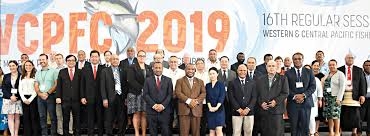By Netani Rika, Port Moresby
INNOVATIVE ideas on fuel consumption and fleet management will take centre stage as Pacific fishing nations attempt to lead the world in climate change management.
Over the next seven days the region will attempt to use a combination of science, best practise and traditional knowledge to claw back losses in this multi-billion-dollar fishery.
Forum Fisheries Commission Chair, Eugene Pangelinan, warned that climate change posed an existential threat to the region, its fisheries industries, national economies and the people.
“At their annual meeting in Tuvalu in August, Pacific Island Forum Leaders have highlighted that climate change is the single greatest threat to the livelihoods, security and wellbeing of the people of the Pacific, and reaffirmed their commitment to progress the implementation of the Paris Agreement,” Pangelinan said.
He was speaking at the opening of the 16th Western and Central Pacific Fisheries Commission Regular Session.
“We are facing an unprecedented global challenge. The impacts of climate change are particularly severe in Pacific Island countries and for many, the threat posed by climate change is an existential one.
“Climate change places a great risk on the benefits to Small Island Developing States in the Pacific from our region’s tuna fisheries. For many of our countries, tuna fisheries are a critical, if not the most critical, renewable resource providing essential social, cultural and economic benefits.”
Papua New Guinea’s Prime Minister, James Marape, echoed Pangelinan’s statement.
Marape said the region must strike the right balance between protection and production so that sustainable development as a heritage could be passed to future generations.
Conservationists estimate that in 2014, fishing companies were paid USD10 billion for 4.99 million tons of tuna landed on docks around the world. After processing the product was worth just over USD42billion.
The Pew Trust has suggested that of all landed tuna in 2014, the Pacific generated USD5billion and an after-processing value of USD22billion.
This supports the wide-held belief that the Pacific makes up 50 per cent of the total global tuna catch.
Pangelinan warned the WCPFC that tuna stocks were increasingly important for food security in the region and essential for the achievement of the SDGs by Pacific Island countries – not just in respect to SDG14 but all of the SDGs.
“FFA members call on the WCPFC, as a collective body made up of all its member countries, to take stronger action on climate change and we look forward to discussing our proposals further with members at this meeting,” he said.
Pangelinan said there was concern over the status of the white striped marlin with stocks reaching critical levels.
“We need to start prioritising the management of these stocks and our failure to do so to date reflects poorly on the WCPFC and all of its members,” he said.
The WCPFC continues tomorrow at the Sir John Guise Indoor Stadium, Waigani.
